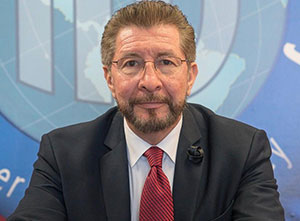Disqualification of presidential candidates wrecks democracy in Guatemala

By: Carlos Sánchez Berzaín - 02/06/2023
Share:
The upcoming general elections in Guatemala, scheduled to take place on 25 June, have been tainted by the disqualification -with inconsistent arguments- of presidential candidates and forebodes an electoral process that is neither free nor fair, a process that has all the features of violating the peoples’ sovereignty. Less than one month shy of the elections, facts reveal that the disqualification of presidential candidates has wrecked democracy in Guatemala due to the violation and inexistence of essential components of democracy.
The Inter American Democratic Charter establishes that “the peoples of the Americas have the right to have democracy and their governments have the obligation to defend it” and it sets as essential components of democracy; the “respect for human rights and individuals’ basic freedoms, access to power and its discharge subject to the rule of law, holding of periodic, free, and fair elections based on universal suffrage concepts and secrecy as an expression of the peoples’ sovereignty, to have a plurality of political parties and organizations, and to have the separation and independence of the branches of government.”
In Guatemala’s electoral process there is not a single one of the essential components of democracy. Human rights and individual basic freedoms -that include to be a candidate- are blatantly violated, there is no rule of law since it has been supplanted by “legalisms,” elections are neither free nor fair, there is no free political organization and participation, and the facts prove that the separation and independence of the branches of government is inexistent.
The violation of essential components of democracy compels us to assume there is a crisis in the system that must be promptly resolved, the absence or disappearance of these components wrecks democracy and makes it disappear and takes the country to a situation of illegality, authoritarianism, instability, and potential violence. This is the unpleasant situation for the electoral process to elect “the President, Vice President, 150 congressional representatives, 340 municipal corporations, and 20 representatives to the Central American Parliament.” this upcoming 25 June of 2023 in Guatemala.
This past February candidates Roberto Arzu and Telma Cabrera were disqualified and on the 19th of May, the 6th Court of the Contentious Administrative Tribunal suspended the candidacy of Carlos Pineda and “of all who run under his party” and by rejecting to hear Pineda’s appeal, the Constitutional Court removed him from the electoral race. The root cause for these three disqualifications does not appear to be transparent and it ranges from an infraction to a regulation, as in Arzu’s case, to a criminal complaint against Telma Cabrera, to an administrative technicality during a meeting, as in Pineda’s case.
Pineda’s exclusion attempts to remove the virtual winner of the first round of the electoral process. According a toll published by Prensa Libre one of the main newspapers of the country, “at the beginning of May, Pineda led the voters’ intention with a 23.1% followed by the former First Lady, the Social Democrat candidate, Sandra Torres with 19.5%.”
The independence of the Judicial Branch is seriously questioned by public opinion, the press, the opposition, and human rights’ organizations who call into question the separation and independence of all branches of government due to rulings of subjected judges that are now operators of political shenanigans, as revealed by the cited cases.
The free press accuses judicial manipulations, as in the case of the newspaper “El Periodico.” On 2 May of 2023, the “8th Criminal Sentencing Tribunal, started its prosecution against Jose Ruben Zamora, president of El Periodico and against Samari Gomez, a Prosecutor’s Assistant from the Special Prosecutor office against impunity.” Zamora has been jailed for the past nine months, a fact that has generated criticism and complaints from defenders of human rights and the free press. The Cable News Network (CNN) describes Zamora as “a journalist who is a critic of the current government of Guatemala who will be judged for three alleged crimes; money laundering, blackmail, and influence peddling, while Gomez is accused of compromising confidential or reserved information.”
The Supreme Electoral Tribunal (TSE in Spanish) is also questioned and facts stemming from its management of the electoral process reveal serious fallacies, such as the missing registry of two million citizens between the ages of 18 and 25 who had registered to vote. Data as of 2021 revealed that Guatemala has 17,110,000 inhabitants and, for the elections of 2023, the TSE has registered 9,372,164 voters, something that represents 54% of the population. One other discrepancy is that of the 3.8 million voters who reside abroad, there are only 88,000 registered to vote.
With this data, beyond any political positioning the actors may have, the factual reality demonstrates that democracy will be absent at the next general elections in Guatemala.
*Attorney & Political Scientist. Director of the Interamerican Institute for Democracy.
www.carlossanchezberzain.com
Translation from Spanish by Edgar L. Terrazas
«The opinions published herein are the sole responsibility of its author».